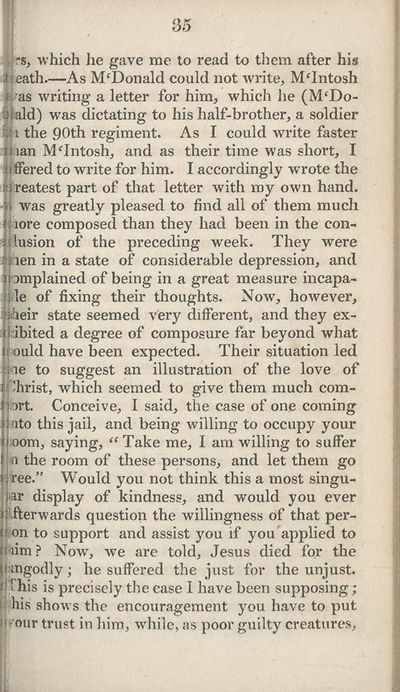Crime & punishment > Notes of conversations with H. M'Donald, N. Sutherland, and H. M'Intosh, (who were executed at Edinburgh, April 22, 1812,) during the time they were under sentence of death
(43)
Download files
Complete book:
Individual page:
Thumbnail gallery: Grid view | List view

■s, which he gave me to read to them after his
ieath.—As M'Donald could not write, MfIntosh
•as writing a letter for him, which he (M‘Do-
ald) was dictating to his half-brother, a soldier
»the 90th regiment. As I could write faster
nan MfIntosh, and as their time was short, I
iffered to write for him. I accordingly wrote the
reatest part of that letter with my own hand,
was greatly pleased to find all of them much
lore composed than they had been in the con¬
tusion of the preceding week. They were
: ten in a state of considerable depression, and
omplained of being in a great measure incapa-
:le of fixing their thoughts. Now, however,
heir state seemed very different, and they ex-
sibited a degree of composure far beyond what
iould have been expected. Their situation led
'ie to suggest an illustration of the love of
Christ, which seemed to give them much com-
brt. Conceive, I said, the case of one coming
nto this jail, and being willing to occupy your
loom, saying, “Take me, I am willing to suffer
h the room of these persons, and let them go
iree.” Would you not think this a most singu-
ar display of kindness, and would you ever
Ifterwards question the willingness of that per¬
ron to support and assist you if you applied to
iiim ? Now, we are told, Jesus died for the
angodly; he suffered the just for the unjust.
This is precisely the case I have been supposing;
diis shows the encouragement you have to put
h our trust in him, while, as poor guilty creatures.
ieath.—As M'Donald could not write, MfIntosh
•as writing a letter for him, which he (M‘Do-
ald) was dictating to his half-brother, a soldier
»the 90th regiment. As I could write faster
nan MfIntosh, and as their time was short, I
iffered to write for him. I accordingly wrote the
reatest part of that letter with my own hand,
was greatly pleased to find all of them much
lore composed than they had been in the con¬
tusion of the preceding week. They were
: ten in a state of considerable depression, and
omplained of being in a great measure incapa-
:le of fixing their thoughts. Now, however,
heir state seemed very different, and they ex-
sibited a degree of composure far beyond what
iould have been expected. Their situation led
'ie to suggest an illustration of the love of
Christ, which seemed to give them much com-
brt. Conceive, I said, the case of one coming
nto this jail, and being willing to occupy your
loom, saying, “Take me, I am willing to suffer
h the room of these persons, and let them go
iree.” Would you not think this a most singu-
ar display of kindness, and would you ever
Ifterwards question the willingness of that per¬
ron to support and assist you if you applied to
iiim ? Now, we are told, Jesus died for the
angodly; he suffered the just for the unjust.
This is precisely the case I have been supposing;
diis shows the encouragement you have to put
h our trust in him, while, as poor guilty creatures.
Set display mode to:
![]() Universal Viewer |
Universal Viewer | ![]() Mirador |
Large image | Transcription
Mirador |
Large image | Transcription
| Permanent URL | https://digital.nls.uk/125759371 |
|---|
| Description | Thousands of printed books from the Antiquarian Books of Scotland collection which dates from 1641 to the 1980s. The collection consists of 14,800 books which were published in Scotland or have a Scottish connection, e.g. through the author, printer or owner. Subjects covered include sport, education, diseases, adventure, occupations, Jacobites, politics and religion. Among the 29 languages represented are English, Gaelic, Italian, French, Russian and Swedish. |
|---|

